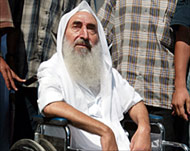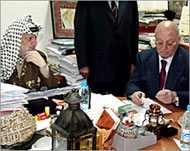Hamas: What is next?
The assassination by Israel on Saturday of Hamas Gaza leader Abd al-Aziz al-Rantisi is the second major blow to the Palestinian Islamist movement in less than a month.

On 22 March, Israel assassinated Hamas founder and spiritual leader Shaikh Ahmad Yasin, sparking off widespread indignation among Palestinians, Arabs and Muslims throughout the world.
The murder of al-Rantisi is likely to further deepen Palestinian frustration and sense of anger.
Moreover, the brazen espousal by the Bush administration of the Israeli Prime Minister Ariel Sharon’s expansionistic designs in the West Bank will make the powder keg even more volatile.
Public support
The assassination of al-Rantisi is unlikely to weaken Hamas’s popularity among the Palestinian people.
Hamas is a huge movement with tens of thousands of supporters who come from all the socio-economic strata of the Palestinian society.
Moreover, Hamas, being an essentially religious movement, will almost always be able to rise up after each blow.
This happened after the assassination of Shaikh Yasin and there is no reason to believe that it will not do so again.
Nevertheless, the assassination of al-Rantisi is bound to result in low morale among Hamas’s rank and file.
Retaliation
 |
|
Hamas has vowed to avenge |
However, such after effects of the assassination will have a short duration as the movement continues to gain more supporters and acquire more popularity as was apparent during Yasin’s and al-Rantisi’s funeral processions.
Some Israeli and Palestinian commentators have argued that Hamas’s failure to retaliate in time after the murder of Shaikh Yasin contributed at least in part to the Israeli decision to assassinate al-Rantisi.
Therefore, the movement is under immense pressure to display a show of strength in the face of a manifestly aggressive Israel.
But carrying out a qualitative retaliation for the assassinations of Yasin and al-Rantisi might well be used by Israel as a pretext to justify a fresh wave of atrocities and assassinations, including possibly targeting PA leader Yasir Arafat.
Palestinian columnist Hani al-Masri of the Ram Allah based daily, al-Ayyam, is one analyst who holds this view.
He told Aljazeera.net that Hamas should rethink some of its resistance tactics for its own safety and for the sake of the collective Palestinian national interest.
“Hamas made a strategic mistake by pushing the conflict with Israel towards a decisive battle without being adequately prepared for the showdown,” he opined.
Al-Masri also believes that Hamas’s key leaders in Gaza and the West Bank should also go underground “because this is the right thing to do”.
Sacrifices for freedom
But Islamist leaders reject any suggestion that Hamas should stop the resistance on the ground that it would only encourage Israel to further attack the Palestinians.
|
“If we don’t offer the required sacrifices for freedom, we will be forced to pay tenfold in terms of subjugation and humiliation” Abu Muhammad, |
“Hamas and its hundreds of thousands of supporters will not be shaken by the martyrdom of al-Rantisi. In our way of thinking, the martyrdom of one leader is viewed as a new birth for Hamas and the entire Islamic Umma [nation],” said Abu Muhammad, a prominent Hamas official in the Hebron region.
The Islamist leader, who asked that he be identified only by his nom de guerre, disagreed with al-Masri.
“If we don’t offer the required sacrifices for freedom, we will be forced to pay tenfold in terms of subjugation and humiliation.”
Abu Muhammed said Hamas would never ever bring itself to join the “train of surrender and humiliation of the Arab regimes and the Palestinian Authority”.
“Look at the disgraced Arab regimes. They didn’t put up any resistance to the American hegemony and bullying. Are they safe? Have they been able to retain their individual or collective dignity? We won’t be like them. Martyrdom is always better than surrender and enslavement.”
However, notwithstanding Hamas’s idealism, it is clear that the movement will have to analyse its choices very carefully.
A few hours after the assassination of al-Rantisi, Hamas leaders in the Gaza Strip chose a leader whose identity they would not reveal, obviously for security reasons.
However, regardless of who the new leader in Gaza is, he will have to maneuver very carefully and wisely between maintaining the resistance against the Israeli occupation on the one hand, and enhancing the movement’s steadfastness and resilience in the face of the Israeli-American axis.
The dilemma
This formidable task, according to Gaza journalist Salah al-Naami, requires “more integration and unity” among the various Palestinian resistance groups.
 |
|
There is greater demand for unity |
Al-Naami believes that Hamas cannot stop the resistance, including the human bombing attacks against Israel, as this would constitute some sort of “political suicide”.
“If they stopped the resistance and introduced political moderation now, it would be viewed as surrender,” says Salah al-Naami, a Gaza journalist familiar with Hamas.
“And this would cost the movement dearly in terms of its popularity.”
It is true that Hamas is a popular movement representing the aspirations and hopes of many Palestinians for freedom and liberation.
But it is also true that Hamas is being attacked on many fronts and shunned by Arab regimes as the PLO had been repeatedly betrayed by the same regimes.
According to Hani al-Masri, the present Palestinian crisis necessitates that Hamas and other resistance groups ought to coalesce into a united Palestinian front, embodying Palestinian national unity.
“Israel would find it harder to fight and defeat a united Palestinian front. It is time Hamas and other Palestinian resistance groups realise this.”
Salah al-Naami agrees that a united front would enhance Palestinian steadfastness considerably.
However, he insists that a step as such cannot be reached without the dismantling of the Palestinian Authority.
“The real question is whether the PA would allow inter-factional unity to materialise. I don’t think so.”